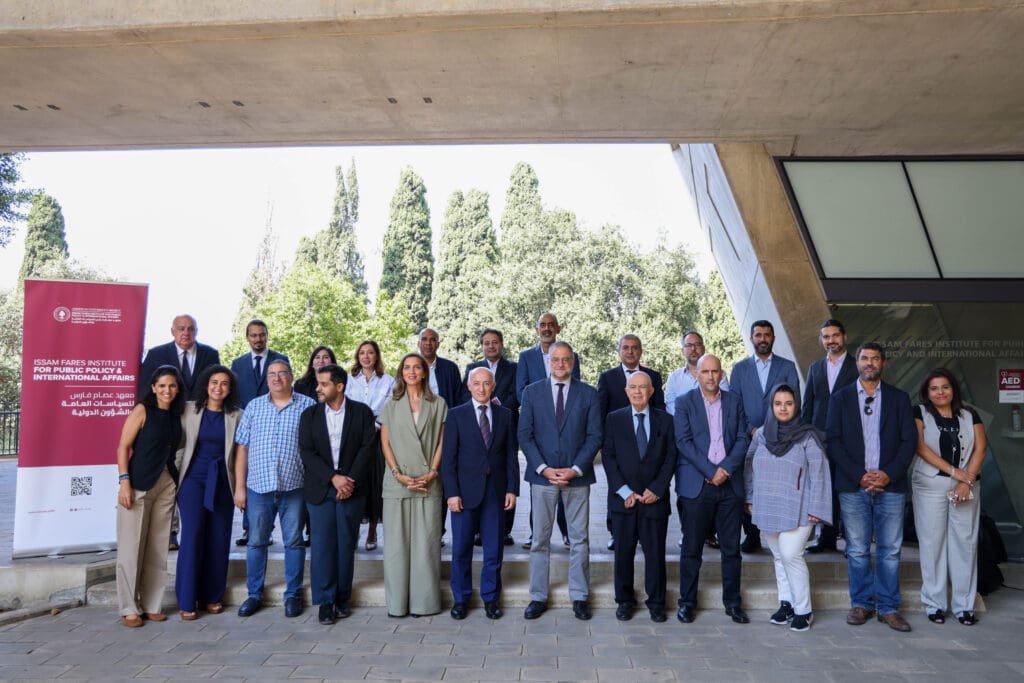Beirut, Lebanon – The 2nd Annual Middle East and North Africa (MENA) Think Tank Forum, co-hosted by the Issam Fares Institute for Public Policy and International Affairs (IFI) at the American University of Beirut, and the Middle East Council on Global Affairs (ME Council), was held on September 15-16 in Beirut. The two-day event gathered members of the Arab Think Tank Network, as well as regional and international experts, to discuss how global shifts impact the region and how regional actors, including think tanks, can engage with and influence the debate on global public goods to ensure it reflects the region’s needs and priorities.
Over two days, representatives of the region’s leading think tanks and policy institutes explored how global public goods are conceptualized and prioritized in the Arab region, with a particular focus on the movement of goods and people, development finance and management of capital flows, as well as climate change. Attendees reflected on the challenges and opportunities for Arab countries in the production, provision, and governance of these goods, and on pathways for potential collaboration, collective action, and policy engagement on global public goods in regional and international fora. The Network also held its first General Assembly on the first day of the forum, where members discussed the network guidelines and strategy and elected a coordination committee.
In his welcoming remarks, IFI Director Joseph Bahout noted that in light of the surrealistic times being witnessed in a region under constant attack, building the Arab Think Tank Network has never been more important. “More than ever,” he said, “our region needs increased discussion, more frank conversations, more like-minded cooperation…and a greater voice on our affairs.” Bahout noted that this year’s forum is particularly important, “because for the first time since its inception, the network will start dealing with issues of substance, and for this year, we’ve chosen to speak of global public goods; not our usual geopolitical topic, but certainly no less critical to the region’s future.” This, as the region continues to face increased security uncertainties and more importantly, “a rising divergence within the region itself.”
Meanwhile, ME Council Senior Fellow and Advisor Tarik M. Yousef noted that “the notion of an increasingly divergent region began around two decades ago, when “Gulf countries, on the back of stability, financial resources, sound economic policies, and predictability, began to pull apart from an Arab world that was increasingly preoccupied with instability, uncertainty, wars, and conflict.” This has indeed created two Arab worlds, and “the gap appears to be widening even further,” Yousef said. While this makes tackling the challenges of the Arab region and its economy more problematic, “it also opens the door for us to bring fresh ideas into the discussion.”
On the sidelines of the forum, IFI and the Arab Think Tank Network held a panel discussion on “Building an Arab Voice on the Governance of Global Public Goods,” featuring Roula Majdalani, Senior Climate Advisor at ICARDA; Tarik M. Yousef, Senior Fellow and Advisor at the Middle East Council on Global Affairs; Ishac Diwan, IFI Associate Fellow and Professor of Practice in Economics at AUB; and moderated by Albert Kostanian, IFI Associate Fellow, Economist, and Expert in Strategy. Speakers discussed key challenges and opportunities for the Arab region in relation to global public goods and explored avenues for regional and international collaboration that advance regional priorities while also contributing to more inclusive global solutions.
The Arab Think Tank Network was officially launched in September 2024, a joint initiative by IFI and ME Council, gathering over 20 leading Arab think tanks and policy institutes from across the region, aimed at enhancing the policy impact of think tanks across the region. IFI currently serves as the network’s secretariat, responsible for coordinating activities, facilitating dialogue, and ensuring the implementation of shared objectives across member institutions. Subscribe to the Network’s newsletter via this link.
About the Issam Fares Institute for Public Policy and International Affairs (IFI) at the American University of Beirut
Inaugurated in 2006, the Issam Fares Institute for Public Policy and International Affairs (IFI) is an independent, research-based, policy-oriented institute, developing policy-relevant research in and about the Arab world. The Institute aims at bridging the gap between academia and policymaking by conducting high-quality research on the complex issues and challenges faced by Lebanese and Arab societies within shifting international and global contexts, by generating evidence-based policy recommendations and solutions for Lebanon and the Arab world and creating an intellectual space for an interdisciplinary exchange of ideas among researchers, scholars, civil society actors, media, and policymakers.
Contact Person
Marina Chamma
Communications Manager
ifi.comms@aub.edu.lb
About the Middle East Council on Global Affairs (ME Council)
The Middle East Council on Global Affairs (ME Council) is an independent, non-profit policy research institution based in Doha, Qatar. It conducts policy-relevant research, convenes meetings and dialogues, and engages policy actors on geopolitical and socioeconomic issues specific to the Middle East and North Africa (MENA) region. Serving as a bridge between the MENA region and the rest of the world, the ME Council provides a regional perspective on global policy issues. It also establishes partnerships with other leading research institutions and development organizations across the MENA region and the world.
Contact Person
Suzanne Houssari
Director of Communications
shoussari@mecouncil.org
www.mecouncil.org

